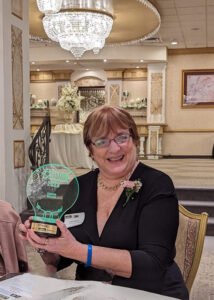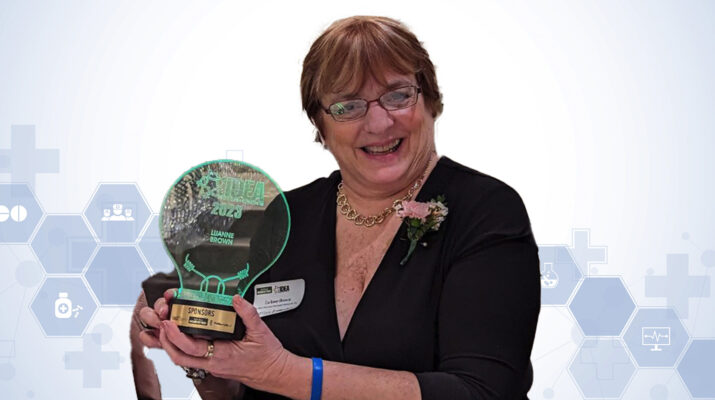Chief executive officer of BPPN working with a group to ensure healthy births for all mothers; initiative triggered by high risk of pregnancy-related mortality faced by Black women
By Brenda Alesii
 Serena Williams is a powerful force in the world of tennis, having won an extraordinary 23 Grand Slams, furthering the role of women — particularly women of color — in the sport and establishing herself as a global business titan.
Serena Williams is a powerful force in the world of tennis, having won an extraordinary 23 Grand Slams, furthering the role of women — particularly women of color — in the sport and establishing herself as a global business titan.
Despite those lofty credentials, Williams nearly died after giving birth to her daughter. She had a history of life-threatening blood clots.
Williams has chronicled how she had to advocate for herself when the symptoms of a clot cropped up during childbirth — even after the continuous dismissal of a healthcare provider. Indeed, Williams’ intense pain and shortness of breath was a result of several pulmonary embolisms. Had they not been discovered, the clots could have traveled to her brain or heart, causing serious damage or even death.
This situation is not unique to Black women in the United States. The Buffalo Prenatal Perinatal Network (BPPN) and a number of community partners are raising awareness about Black maternal health. The organization said it is committed to making equitable, systemic, changes through policy, clinical care, engagement to improve the disparities and birth outcomes.
In Good Health spoke to LuAnne Brown, a Lancaster resident who is CEO of BPPN. Brown worked for 30 years at Women’s & Children’s Hospital, last serving as chief nursing officer.
Q. Why do Black women face three times the higher risk of pregnancy-related mortality than white women?
A. All Black women deal with structural racism. Look at Serena Williams, a wealthy woman with a lot of resources, in great shape, but is suffering from pulmonary embolisms after childbirth. No one was listening to her. Structural racism results in “weathering,” which can cause stress, potentially increasing cortisol levels, may stimulate labor. A Black woman who emigrated from Africa has a better labor outcome than someone who grew up in the United States. Implicit bias takes many forms — Black woman often aren’t listened to, and there may be a perception that they don’t feel pain as others do. We all have biases, but we need to recognize them.
Q. How does BPPN help expectant mothers?
A. We service women in high-risk neighborhoods. One effective approach to improving birth outcomes is home visits, providing women and families with education and support, including referrals. We doulas [who are non clinical personnel] provide physical and emotional support during labor but also to expectant and postpartum moms. For example, we will be starting a pilot project where BPPN staff will teach women how to self-monitor with blood pressure cuffs, record their numbers on a log, teach what’s normal, and hopefully stem potential problems.
We also do breast-feeding education, screen for domestic violence, substance abuse and depression, which is common. There is a fear among some women that their baby will be taken away if they acknowledge feelings of depression and anxiety. I have some staff who go door-to-door to help with implementing health programs. We found a woman living in her car with a toddler.
Q. Who else does BPPN help?
A. Our client base is 50% African American, 40% Hispanic and 10% white or multiracial. The impact of COVID-19, economic insecurity and the number of women who are fleeing states with strict abortion laws are adding to the maternal health crisis.
We also have fatherhood programs, offering support groups, teaching men co-parenting skills and how to engage with their children, which we hope leads to a decrease in conflict. Staying in school is highly encouraged. We’ve taught classes in the holding center and have seen good outcomes; the guys love it.
Q. How long has the organization been in existence and how many families do you typically serve?
A. BPPN was launched in 1987. We serve 1,000 families per year. As part of our outreach, we set up all sorts of activities in the community: Easter egg hunts, Halloween parties, summer picnics, a fall feast, Christmas parties, to name a few. During COVID-19, we even dropped food off on porches and set up a pantry at the agency.
Q. Can you share a success story?
A. There are many. I remember one client who got pregnant at 12. She finished high school, continued to further her education and became a licensed practical nurse. Her son recently graduated from college. She speaks about her experience and how she overcame so many obstacles with our support.
Q. How is BPPN funded?
A. Mostly grants from the Office of Child & Family Services, NYS Department of Health, United Way, and Community Foundation for Greater Buffalo.
Q. How can BPPN be reached?
A. Our phone number is 716-884-6711; website: www.bppn.org; our office is located at 703 Washington in Buffalo.

